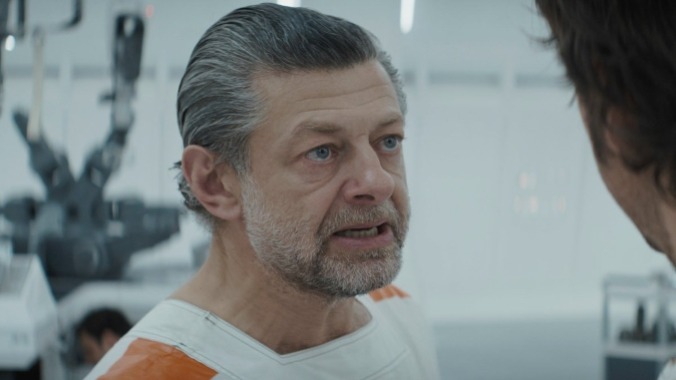The MVP: Andy Serkis’ Performance in Andor Sells Kino Loy’s Redemption
Photo Courtesy of Disney+
Editor’s Note: Welcome to The MVP, a column where we celebrate the best performances TV has to offer. Whether it be through heart-wrenching outbursts, powerful looks, or perfectly-timed comedy, TV’s most memorable moments are made by the medium’s greatest players—top-billed or otherwise. Join us as we dive deep on our favorite TV performances, past and present:

We’ve gotten a non-stop stream of Star Wars stuff these last few years, but even judged charitably, a hefty percentage of this output has been lacking in the originality department. As much as I can still go in for this universe of laser-sword-wielding space monks and spice runners, between tiresome shows like Obi-Wan Kenobi or Book of Boba Fett, these stories have returned to the well a few too many times. In this context, it was all the more surprising when Andor, another series retelling past events, not only turned out to be the most memorable Star Wars thing in recent memory, but also one of the best TV shows in the last few years period.
One of the most critical aspects of the series’ success is its complex characters, each finding different ways to navigate the oppressive hegemony of this fascist Empire, whether that means fighting against it, joining it, or scraping out an existence in the diminishing territory outside its reach. And of this compelling bunch, there’s one who succinctly sums up the show’s arc: Kino Loy, a character played to perfection by Andy Serkis. While Kino begins as a hellish middle manager dedicated to upholding an unjust status quo, this performance adds shades of nuance, inviting us to hope and imagine there may be something more underneath his initially callous exterior.
When we meet Kino, he’s nothing short of a class traitor. After our burgeoning revolutionary, Cassian Andor (Diego Luna), is sentenced to six years in prison at Narkina 5 for a crime he didn’t commit, he’s assigned to Kino Loy’s section of the facility. Loy is a fellow prisoner who serves as a floor commander, which means he’s tasked with maximizing the output of his men. From the jump, Serkis’ grumbly line delivery and barely suppressed anger make him feel appropriately gruff and mean, the type of brutal boss who initially seems eager to kiss management’s ass.
Serkis’ strained neck and bulging eyes communicate his agitation when anything remotely threatens the group’s productivity and, in his eyes, the upcoming end of his sentence. But while the character is initially deplorable, Serkis doesn’t play him like an incompetent, sniveling weasel. Just like everyone else, he’s trapped in this place, and we later find this massive moral compromise he’s made is at least partially borne out of the belief that this may be the best way for everyone to get out of here someday. The sharpness with which he barks orders swiftly communicates that he’s completely bought into the system and believes that, if they all play by the rules, they’ll eventually escape this hellish prison.
Although he doesn’t exactly make the best first impression, we quickly begin to see something else. After other prisoners gossip that this situation is a ruse because none of them will get out of here, Kino borderline flies off the handle, lashing out in a way that seems to imply he also nurtures some lingering doubts about whether there is really an end to their terms. Without directly saying as much, Serkis’ irritable outbursts key us in that there are some cracks in the armor and that, unlike the hopeless bootlicker Syril Karn (Kyle Soller), there’s some hope he may come over to the right side.
Never missing a beat, Cassian picks up on this and starts working on him, hinting at the fact he’s likely also daydreamed about what a breakout would entail. Even as Kino brushes him off, Serkis’ low tenor and calm demeanor hints that there’s more bubbling underneath the surface and that, while part of him may be tempted, he doesn’t want to screw up so close to the end of his term. We can see how long he’s been here in his baggy eyes, scraggly facial hair, and the way the performer communicates a grim resignation, repeating the soul-crushing motto “On program!” which, like everyone else, he’s been conditioned to use through the threat of violence.